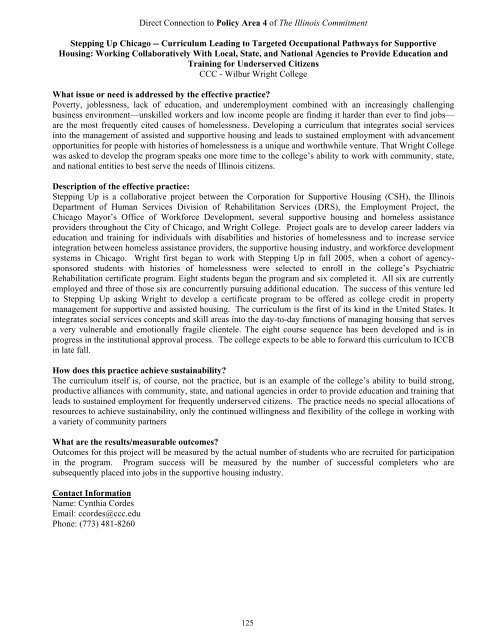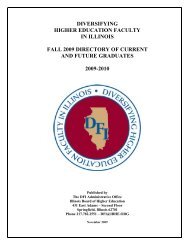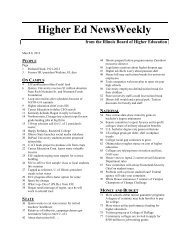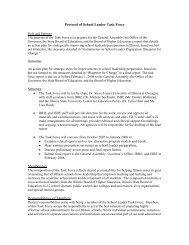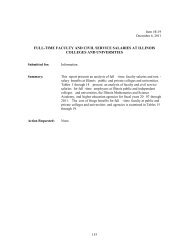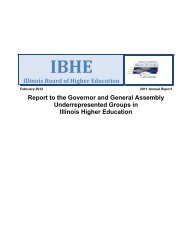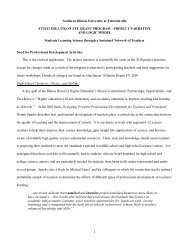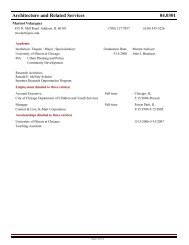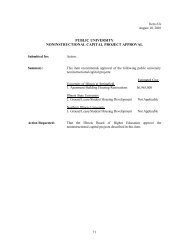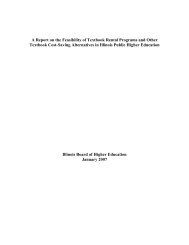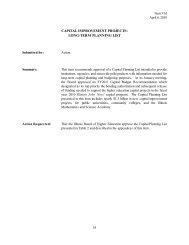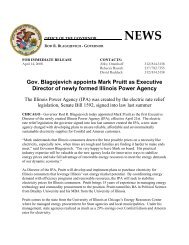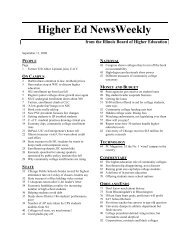Title of Effective Practice: - California Postsecondary Education ...
Title of Effective Practice: - California Postsecondary Education ...
Title of Effective Practice: - California Postsecondary Education ...
You also want an ePaper? Increase the reach of your titles
YUMPU automatically turns print PDFs into web optimized ePapers that Google loves.
Direct Connection to Policy Area 4 <strong>of</strong> The Illinois Commitment<br />
Stepping Up Chicago -- Curriculum Leading to Targeted Occupational Pathways for Supportive<br />
Housing: Working Collaboratively With Local, State, and National Agencies to Provide <strong>Education</strong> and<br />
Training for Underserved Citizens<br />
CCC - Wilbur Wright College<br />
What issue or need is addressed by the effective practice?<br />
Poverty, joblessness, lack <strong>of</strong> education, and underemployment combined with an increasingly challenging<br />
business environment—unskilled workers and low income people are finding it harder than ever to find jobs—<br />
are the most frequently cited causes <strong>of</strong> homelessness. Developing a curriculum that integrates social services<br />
into the management <strong>of</strong> assisted and supportive housing and leads to sustained employment with advancement<br />
opportunities for people with histories <strong>of</strong> homelessness is a unique and worthwhile venture. That Wright College<br />
was asked to develop the program speaks one more time to the college’s ability to work with community, state,<br />
and national entities to best serve the needs <strong>of</strong> Illinois citizens.<br />
Description <strong>of</strong> the effective practice:<br />
Stepping Up is a collaborative project between the Corporation for Supportive Housing (CSH), the Illinois<br />
Department <strong>of</strong> Human Services Division <strong>of</strong> Rehabilitation Services (DRS), the Employment Project, the<br />
Chicago Mayor’s Office <strong>of</strong> Workforce Development, several supportive housing and homeless assistance<br />
providers throughout the City <strong>of</strong> Chicago, and Wright College. Project goals are to develop career ladders via<br />
education and training for individuals with disabilities and histories <strong>of</strong> homelessness and to increase service<br />
integration between homeless assistance providers, the supportive housing industry, and workforce development<br />
systems in Chicago. Wright first began to work with Stepping Up in fall 2005, when a cohort <strong>of</strong> agencysponsored<br />
students with histories <strong>of</strong> homelessness were selected to enroll in the college’s Psychiatric<br />
Rehabilitation certificate program. Eight students began the program and six completed it. All six are currently<br />
employed and three <strong>of</strong> those six are concurrently pursuing additional education. The success <strong>of</strong> this venture led<br />
to Stepping Up asking Wright to develop a certificate program to be <strong>of</strong>fered as college credit in property<br />
management for supportive and assisted housing. The curriculum is the first <strong>of</strong> its kind in the United States. It<br />
integrates social services concepts and skill areas into the day-to-day functions <strong>of</strong> managing housing that serves<br />
a very vulnerable and emotionally fragile clientele. The eight course sequence has been developed and is in<br />
progress in the institutional approval process. The college expects to be able to forward this curriculum to ICCB<br />
in late fall.<br />
How does this practice achieve sustainability?<br />
The curriculum itself is, <strong>of</strong> course, not the practice, but is an example <strong>of</strong> the college’s ability to build strong,<br />
productive alliances with community, state, and national agencies in order to provide education and training that<br />
leads to sustained employment for frequently underserved citizens. The practice needs no special allocations <strong>of</strong><br />
resources to achieve sustainability, only the continued willingness and flexibility <strong>of</strong> the college in working with<br />
a variety <strong>of</strong> community partners<br />
What are the results/measurable outcomes?<br />
Outcomes for this project will be measured by the actual number <strong>of</strong> students who are recruited for participation<br />
in the program. Program success will be measured by the number <strong>of</strong> successful completers who are<br />
subsequently placed into jobs in the supportive housing industry.<br />
Contact Information<br />
Name: Cynthia Cordes<br />
Email: ccordes@ccc.edu<br />
Phone: (773) 481-8260<br />
125


